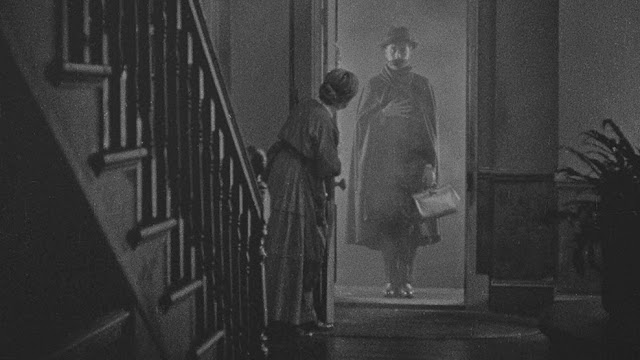The Lodger (1927)
Alfred Hitchcock's "The Lodger"
For over 60 years, Alfred Hitchcock directed some of the most iconic films ever put to screen. He is often considered one of the greatest filmmakers of all time. He is especially known for his 'thriller' genre. The film that not only started this string of thriller genre films, but also Hitchcock as a reputable director, was 1927's "The Lodger." This silent film is based on a 1913 novel of the same name by Marie Belloc Lowndes and concerns a serial killer loose in London.
The serial killer at the heart of the film is based on the real London killer, Jack the Ripper. As this killer murders women late at night in the streets of London, a new, mysterious man takes lodging at the Bunting house. Mr. and Mrs. Bunting begin to grow suspicious of this new lodger after he starts becoming familiar with their daughter, Daisy. Daisy's sweetheart, Joe, also begins to have concerns with the new lodger after his interest in her. Joe is assigned to the case of the London killer, The Avenger. After Joe suspects the lodger of being the Avenger, he arrests him only for the lodger to flee. After an angry mob chase and beat the lodger (suspecting him of being the Avenger), it is revealed that the lodger is in fact not the Avenger and instead, was hunting the Avenger for the murder of his sister.
Much of the film's style is borrowed from the newly popular German Expressionism movement. Hitchcock had recently just arrived back in London after learning from the styles of modern directors in Berlin . He used various lighting techniques and visual angles that imbued the story with dramatic tension and suspense. Because of this, the film has a heightened sense of anxiety. This anxiety was something Hitchcock was intentional about, as he wanted his film to mirror the social unrest of post-WWI Europe.
Many themes found within the film demonstrate what would become a through-line through the rest of Hitchcock's 60 years of work. The psychological attraction to the association of sex and murder, the unravelling of mystery, and the thrilling suspense of the 'wrong man' notion can all be found both in "The Lodger" and Hitchcock's oeuvre. Throughout the film, we believe the lodger to be the Avenger, making us suspect of his every action. When we see him sexually frustrated with Daisy, we associate his presumed desire for murder. This blend between sex and death creates a psychological confusion between the two. Hitchcock often uses sexual frustration as a mechanism for his films' anxious suspense of death. This desire that is mirrored within the audience then becomes confused with the characters' desire for murder. This confusion and convolution between the two extremes create a higher thrill within the viewer. Most people don't go walking around with a desire to murder. But, when Hitchcock uses the audience's empathy for the characters' sexual frustrations to mix with the frightened anxiety of murder, the adrenalin begins to pump, indeed. Another element of the film that echoes the styles found in Hitchcock's work is that of the unfolding mystery. Throughout the story, we fully believe the lodger to be the killer. When it is revealed that he was not the killer, there is a sense of a 'twist ending.' This 'rug-pulled-out-from-under-you' realization is a staple of a Hitchcockian thriller. It is one more element of shock to add to an already thrilling storyline. Finally, the 'wrong man' element of "The Lodger" is another start of a Hitchcock staple. If there is any more fuel to add to the fire of suspense, the notion that an innocent man (whom the audience can identity) is accused of something he didn't do or someone he is not pulls the tension up to a maximum zenith. On top of the sexual frustration, threat of murder, and the threat of what's to come, the notion that one could be accused of just about anything for simply being in the wrong place at the wrong time is just another level of anxiety to instill into an audience that is already so full of post-war social unrest and paranoia. These ingredients all create a stew of a classic Hitchcockian thriller.
"The Lodger" ended up being both a critical and commercial success. One publication, Bioscope, even called it "the finest British production ever made." It was so impactful in the world of cinema that it helped shaped all thriller pieces to come.




Comments
Post a Comment